 The city in this story from Alice Adams is San Francisco. An attractive young woman invites an aging, recently widowed doctor to a party where he encounters people who bring back unpleasant memories from his past. After fantasizing about a potential relationship with the woman, he learns she is an investigative journalist looking for a story. Disenchanted, he decides to move to Mexico to care for his ailing mother and help in two charity clinics he has established there. At least I more or less understand the corruption there, he argues. Themes: love, grief, memories, loneliness, hope, corruption, guilt/shame, selfishness. More…
The city in this story from Alice Adams is San Francisco. An attractive young woman invites an aging, recently widowed doctor to a party where he encounters people who bring back unpleasant memories from his past. After fantasizing about a potential relationship with the woman, he learns she is an investigative journalist looking for a story. Disenchanted, he decides to move to Mexico to care for his ailing mother and help in two charity clinics he has established there. At least I more or less understand the corruption there, he argues. Themes: love, grief, memories, loneliness, hope, corruption, guilt/shame, selfishness. More…
Category Archives: Short Stories
The Birthmark
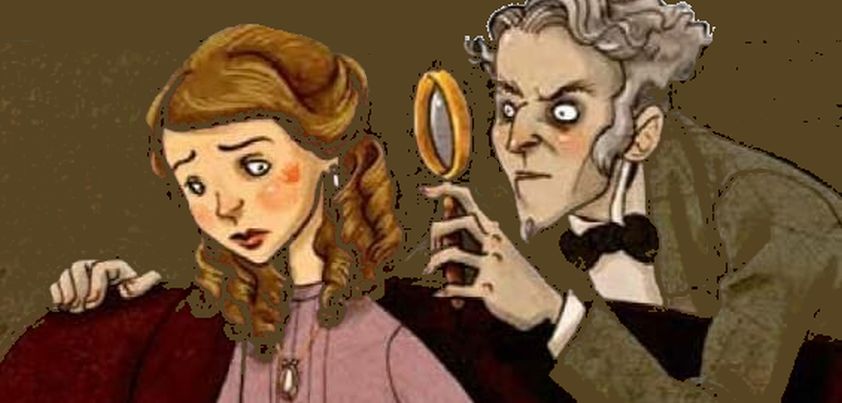 In this story by Nathaniel Hawthorne, a brilliant scientist takes a break from his work to marry a woman of nearly perfect beauty. Her one “blemish” is a small hand-shaped birthmark on her left cheek. Much of the scientist’s work has involved (often unsuccessfully) trying to manipulate the laws of Nature. As he begins to obsess over the frightful birthmark, his wife agrees to allow him to remove it… even if it costs her life! The story’s message: the folly of pursuing human perfection; no one is flawless. Themes: perfection, obsession, hubris, religion, gender roles, submission/sacrifice, science vs. nature, mortality. More…
In this story by Nathaniel Hawthorne, a brilliant scientist takes a break from his work to marry a woman of nearly perfect beauty. Her one “blemish” is a small hand-shaped birthmark on her left cheek. Much of the scientist’s work has involved (often unsuccessfully) trying to manipulate the laws of Nature. As he begins to obsess over the frightful birthmark, his wife agrees to allow him to remove it… even if it costs her life! The story’s message: the folly of pursuing human perfection; no one is flawless. Themes: perfection, obsession, hubris, religion, gender roles, submission/sacrifice, science vs. nature, mortality. More…
Cheap at Half the Price
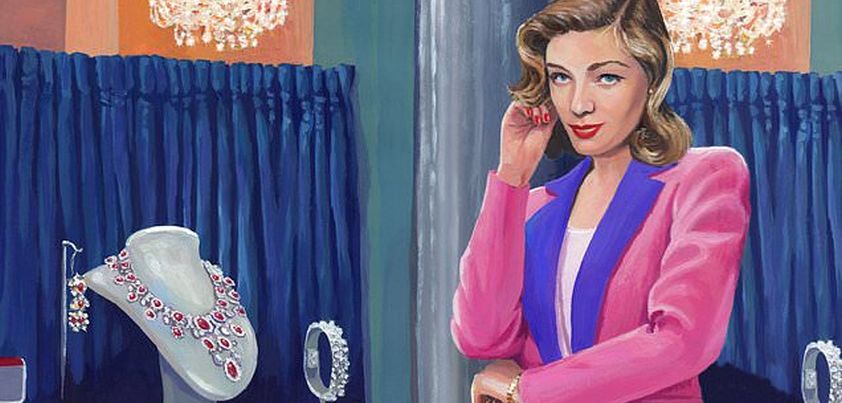 The questionable message of this story by Jeffrey Archer is expressed in the opening line: Women are naturally superior to men, and Consuela Rosenheim was no exception. The beautiful socialite is nearing the end of the third of the four or five marriages she is planning on to become independently wealthy. After searching for a birthday present, she has her heart set on a million pound diamond-and-ruby necklace. Knowing her husband’s weaknesses, she hatches a plan whereby the deluded man thinks he was clever enough to buy it for half the asking price. Themes include materialism, sexuality, manipulation, deception, infidelity. More…
The questionable message of this story by Jeffrey Archer is expressed in the opening line: Women are naturally superior to men, and Consuela Rosenheim was no exception. The beautiful socialite is nearing the end of the third of the four or five marriages she is planning on to become independently wealthy. After searching for a birthday present, she has her heart set on a million pound diamond-and-ruby necklace. Knowing her husband’s weaknesses, she hatches a plan whereby the deluded man thinks he was clever enough to buy it for half the asking price. Themes include materialism, sexuality, manipulation, deception, infidelity. More…
Wicked Girl
 In this story by Isabel Allende a solitary, prepubescent eleven-year-old tries to sexually arouse her mother’s secret lover. At first the soundly sleeping man responds but, when he wakes and realizes who it is, he violently casts her aside. After she is sent to a convent, the profoundly affected man develops an unhealthy attraction towards young girls. When they meet again fifteen years later, he begs forgiveness for having rejected her in the hope this will cure his poisoned mind. She is speechless, not remembering the event. Themes include solitariness/disconnection, sexuality, obsession, the power of passion, escape, resilience. More…
In this story by Isabel Allende a solitary, prepubescent eleven-year-old tries to sexually arouse her mother’s secret lover. At first the soundly sleeping man responds but, when he wakes and realizes who it is, he violently casts her aside. After she is sent to a convent, the profoundly affected man develops an unhealthy attraction towards young girls. When they meet again fifteen years later, he begs forgiveness for having rejected her in the hope this will cure his poisoned mind. She is speechless, not remembering the event. Themes include solitariness/disconnection, sexuality, obsession, the power of passion, escape, resilience. More…
Looking for a Rain-God
 This story by Botswanan writer Bessie Head deals with one of the world’s most terrible crimes. It takes place in Botswana’s “lonely lands” where families usually live a poor but contented life in harmony with nature. Every year, when village headmen proclaim the beginning of the cropping season, farming families relocate from the villages to their ploughing lands. We follow a family who, having endured six years of crippling drought, reach a point in the seventh year where they feel they must make a devastating decision: to all perish from starvation or sacrifice their children to a rain-god. More…
This story by Botswanan writer Bessie Head deals with one of the world’s most terrible crimes. It takes place in Botswana’s “lonely lands” where families usually live a poor but contented life in harmony with nature. Every year, when village headmen proclaim the beginning of the cropping season, farming families relocate from the villages to their ploughing lands. We follow a family who, having endured six years of crippling drought, reach a point in the seventh year where they feel they must make a devastating decision: to all perish from starvation or sacrifice their children to a rain-god. More…
The Paper Menagerie
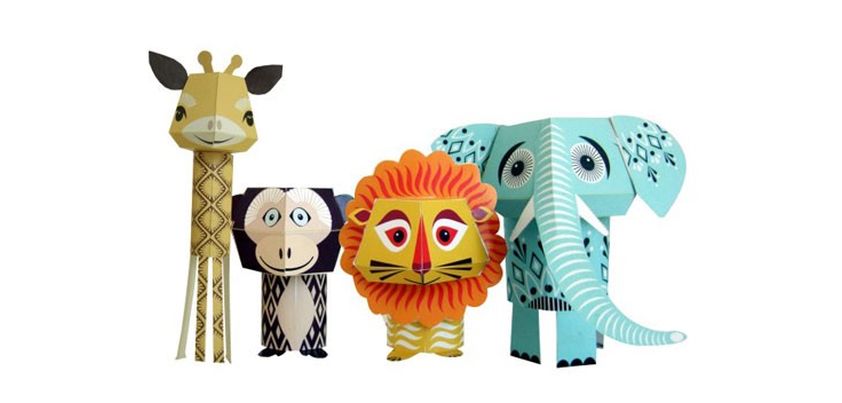 The central message of this poignant story from Ken Liu is in these lines: You know what the Chinese think is the saddest feeling in the world? It’s for a child to finally grow the desire to take care of his parents, only to realize that they were long gone. An American high schooler rejects his heritage and distances himself from his poorly educated, non-English speaking mother. After her death, he finds something that changes his outlook and brings back the magical world she had created for him as a child. Themes: struggle, cultural assimilation, identity, resentment, motherly love, imagination. More…
The central message of this poignant story from Ken Liu is in these lines: You know what the Chinese think is the saddest feeling in the world? It’s for a child to finally grow the desire to take care of his parents, only to realize that they were long gone. An American high schooler rejects his heritage and distances himself from his poorly educated, non-English speaking mother. After her death, he finds something that changes his outlook and brings back the magical world she had created for him as a child. Themes: struggle, cultural assimilation, identity, resentment, motherly love, imagination. More…
Doc’s Story
 In this story by John Edgar Wideman, a young man recovering from a break-up with his girlfriend is inspired by a story about “Doc”, a former academic and college basketballer who lost his eyesight. Doc could still shoot baskets from the foul line, and once held his own in a full game. This causes him to wonder whether, if he had told Doc’s story to his former girlfriend (If a blind man could play basketball surely we . . .), he could have saved their relationship. Themes include relationships, storytelling, race, depression, overcoming challenges, inspiration, hope. More…
In this story by John Edgar Wideman, a young man recovering from a break-up with his girlfriend is inspired by a story about “Doc”, a former academic and college basketballer who lost his eyesight. Doc could still shoot baskets from the foul line, and once held his own in a full game. This causes him to wonder whether, if he had told Doc’s story to his former girlfriend (If a blind man could play basketball surely we . . .), he could have saved their relationship. Themes include relationships, storytelling, race, depression, overcoming challenges, inspiration, hope. More…
The Wreath
 In this moving story by Luigi Pirandello, a middle-aged doctor is disturbed to learn that his much younger wife, who still has feelings for a former lover who died before they married, has gone behind his back and secretly ordered a wreath for the anniversary of his death. At first angry and ready to “take her back to her father’s house,” he calms down and finally accompanies her to the cemetery. Touched by his gesture, she looks at him as she had never looked at him before. Themes include the beauty of nature, love, mourning, deceit, understanding and compassion. More…
In this moving story by Luigi Pirandello, a middle-aged doctor is disturbed to learn that his much younger wife, who still has feelings for a former lover who died before they married, has gone behind his back and secretly ordered a wreath for the anniversary of his death. At first angry and ready to “take her back to her father’s house,” he calms down and finally accompanies her to the cemetery. Touched by his gesture, she looks at him as she had never looked at him before. Themes include the beauty of nature, love, mourning, deceit, understanding and compassion. More…
The Son
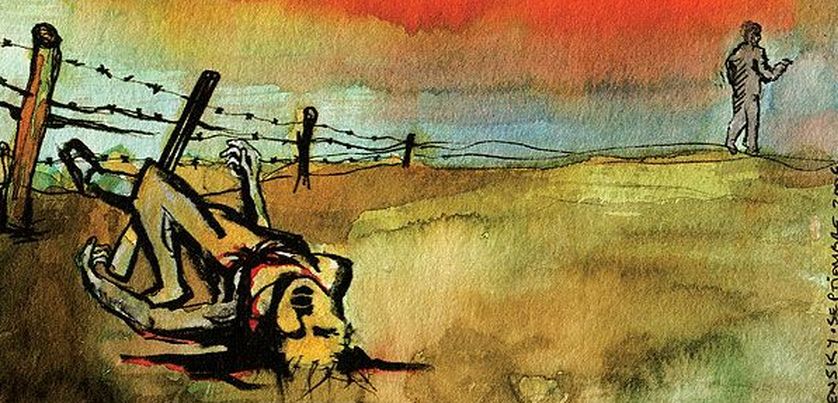 In this emotionally charged story by Horacio Quiroga, a thirteen-year-old boy goes hunting in woods near his home. He is well aware of the dangers associated with hunting alone, and competent in the use of a gun. The boy’s father, who is not well and suffers from hallucinations, becomes concerned when he does not return at the agreed time. Fearing the worst, he begins a frantic search, growing increasingly anxious until finding, or thinking he finds, the boy safe and unharmed. Themes include parental love, isolation, nature and survival, trust, anxiety, fear, illusion, death. More…
In this emotionally charged story by Horacio Quiroga, a thirteen-year-old boy goes hunting in woods near his home. He is well aware of the dangers associated with hunting alone, and competent in the use of a gun. The boy’s father, who is not well and suffers from hallucinations, becomes concerned when he does not return at the agreed time. Fearing the worst, he begins a frantic search, growing increasingly anxious until finding, or thinking he finds, the boy safe and unharmed. Themes include parental love, isolation, nature and survival, trust, anxiety, fear, illusion, death. More…
The Rocking-Horse Winner
 This tragic story by D. H. Lawrence is about a boy whose parents seem more interested in their social position than their children. The only adults who have time for the boy are an uncle and the family’s young gardener, both of whom are passionate followers of horseracing. The boy desperately wants his mother’s love and approval. As she is constantly complaining about not having enough money, he comes up with an unusual approach to winning some by betting on the races. Themes include family/parental responsibility, materialism and appearances, greed, selfishness, “luck” vs. hard work. More…
This tragic story by D. H. Lawrence is about a boy whose parents seem more interested in their social position than their children. The only adults who have time for the boy are an uncle and the family’s young gardener, both of whom are passionate followers of horseracing. The boy desperately wants his mother’s love and approval. As she is constantly complaining about not having enough money, he comes up with an unusual approach to winning some by betting on the races. Themes include family/parental responsibility, materialism and appearances, greed, selfishness, “luck” vs. hard work. More…
The Magic Shop
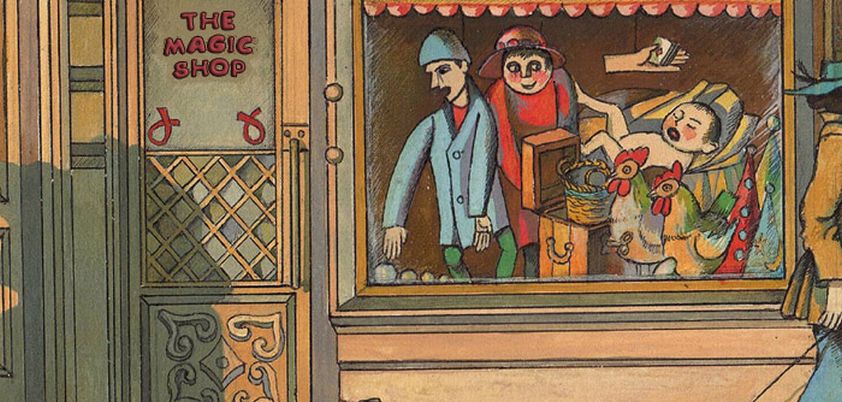 This delightful fantasy from H. G. Wells is about ‘magic’ and perception. A father and son enter a strange Magic Shop. As they begin to look around, the shopkeeper appears and entertains them with some ‘magic’. The innocent boy watches in awe, while his skeptical father looks for the sources of trickery. The pair moves further into the store and witness additional, seemingly impossible wonders. The father, realizing that what he sees may be real, becomes increasingly uncomfortable and begins to suspect the presence of unnatural forces. Themes: childhood innocence and wonder, father-son relationships, trickery vs. the supernatural. More…
This delightful fantasy from H. G. Wells is about ‘magic’ and perception. A father and son enter a strange Magic Shop. As they begin to look around, the shopkeeper appears and entertains them with some ‘magic’. The innocent boy watches in awe, while his skeptical father looks for the sources of trickery. The pair moves further into the store and witness additional, seemingly impossible wonders. The father, realizing that what he sees may be real, becomes increasingly uncomfortable and begins to suspect the presence of unnatural forces. Themes: childhood innocence and wonder, father-son relationships, trickery vs. the supernatural. More…
The Night Face Up
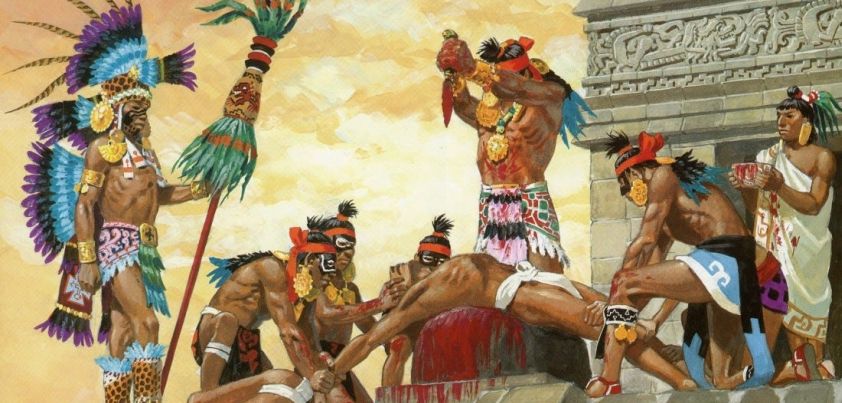 In this story by Julio Cortázar, a man hospitalized after a motorcycle accident drifts in and out between the “present” and a “dream” in which he is a member of an ancient tribe being hunted by Aztec warriors for sacrifice. As he struggles to stay awake in his hospital ward, his dream-self is captured, imprisoned, and carried up the temple steps for execution. At the moment of death, he recalls a dream about riding through an astonishing city on an enormous metal insect that whirred away between his legs. Themes include time and space (parallel worlds), existence, dreams vs. reality. More…
In this story by Julio Cortázar, a man hospitalized after a motorcycle accident drifts in and out between the “present” and a “dream” in which he is a member of an ancient tribe being hunted by Aztec warriors for sacrifice. As he struggles to stay awake in his hospital ward, his dream-self is captured, imprisoned, and carried up the temple steps for execution. At the moment of death, he recalls a dream about riding through an astonishing city on an enormous metal insect that whirred away between his legs. Themes include time and space (parallel worlds), existence, dreams vs. reality. More…
The Sentimentalists
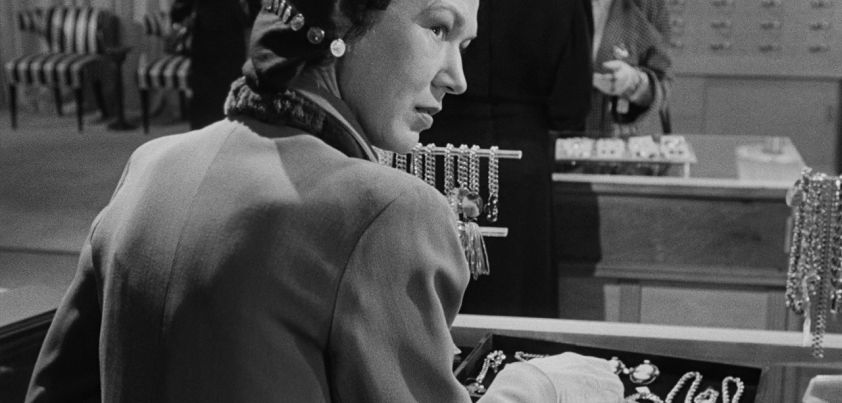 In this story by Morley Callaghan two young men, one a law student, are shopping in a department store when they notice a store detective watching three women at the stocking counter. There was a stout, well-dressed older woman, a lanky schoolgirl, and a demure “girl next door” type. They bet on which one the detective is watching and, after two move away, the lawyer moves in and saves the guilty party. Unfortunately, all he gets for his trouble is a kick in the shins. Themes include petty crime, stereotyping, desperation, hope, insensitivity, betrayal. More…
In this story by Morley Callaghan two young men, one a law student, are shopping in a department store when they notice a store detective watching three women at the stocking counter. There was a stout, well-dressed older woman, a lanky schoolgirl, and a demure “girl next door” type. They bet on which one the detective is watching and, after two move away, the lawyer moves in and saves the guilty party. Unfortunately, all he gets for his trouble is a kick in the shins. Themes include petty crime, stereotyping, desperation, hope, insensitivity, betrayal. More…
Homecoming
 This story by Carlos Bulosan highlights a devastating side-effect of the mass immigration of Filipino men and boys to America in the first half of last Century. In the story, a young man who had immigrated at fifteen returns home after twelve years. Following a tearful reunion, he is devastated to learn that the family is destitute. His father is dead, his mother too frail to get around, and one of his sisters has had to prostitute herself. Even worse, there is nothing he can do to help! Themes include failure, reunion, poverty, desperation, despair, shame. More…
This story by Carlos Bulosan highlights a devastating side-effect of the mass immigration of Filipino men and boys to America in the first half of last Century. In the story, a young man who had immigrated at fifteen returns home after twelve years. Following a tearful reunion, he is devastated to learn that the family is destitute. His father is dead, his mother too frail to get around, and one of his sisters has had to prostitute herself. Even worse, there is nothing he can do to help! Themes include failure, reunion, poverty, desperation, despair, shame. More…
The Mystery of the Missing Cap
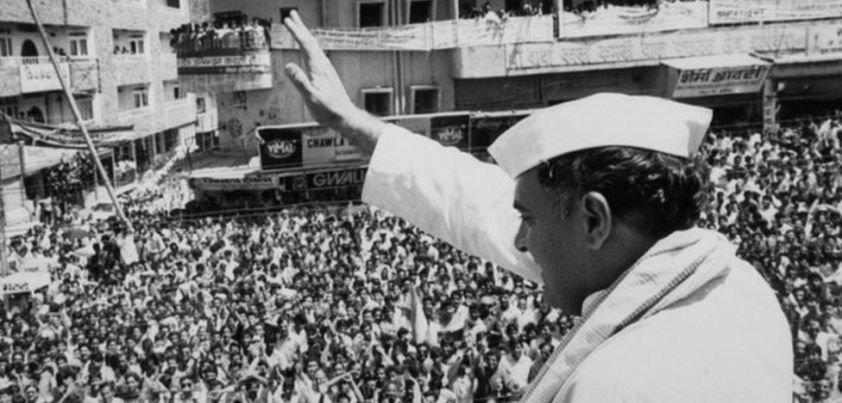 It is evident from Babu Virkishore’s absurd ministerial title that this Manoj Das story is a political satire. The comment about the cap’s disappearance being a deep-rooted conspiracy with possible devastating political effects suggests that it is a “Nehru topi” (pictured above). The main themes, comically highlighted when Jhandoo the monkey tries on the cap and then hands it back to the bemused Minister are: 1) many officials of the day weren’t ready to govern; and 2) the general population was too poorly educated and reverent towards those in power to see this. Other themes: innocence, elitism, hubris, honesty, disillusionment. More…
It is evident from Babu Virkishore’s absurd ministerial title that this Manoj Das story is a political satire. The comment about the cap’s disappearance being a deep-rooted conspiracy with possible devastating political effects suggests that it is a “Nehru topi” (pictured above). The main themes, comically highlighted when Jhandoo the monkey tries on the cap and then hands it back to the bemused Minister are: 1) many officials of the day weren’t ready to govern; and 2) the general population was too poorly educated and reverent towards those in power to see this. Other themes: innocence, elitism, hubris, honesty, disillusionment. More…
Gloria’s Saturday
 The message of this tragic love story by Mario Benedetti is to treasure the time you have with your loved ones because life can be cut short at any time. The story is told in the form of a narrative written by a husband sitting in an all-night vigil at the bedside of his critically ill wife. Intending to share it with her when she survives, he expresses regret over how they allowed their busy lifestyles to hinder their ability to spend quality time together. Themes include fear, love, mortality, work-life balance, grief, regret. More…
The message of this tragic love story by Mario Benedetti is to treasure the time you have with your loved ones because life can be cut short at any time. The story is told in the form of a narrative written by a husband sitting in an all-night vigil at the bedside of his critically ill wife. Intending to share it with her when she survives, he expresses regret over how they allowed their busy lifestyles to hinder their ability to spend quality time together. Themes include fear, love, mortality, work-life balance, grief, regret. More…
The Book of Sand
 This story by Jorge Borges deals with one of the author’s common themes… the infinite. In this case, a book lover exchanges a rare edition of the bible for a book that can’t be understood. It is in a strange language and has an endless number of randomly changing pages. He becomes obsessed with discovering the book’s secrets and, when he fails, concludes that it is so “monstrous” that it should be hidden away somewhere it will never be found. Other themes include spirituality, the power of books, obsession (the need to understand), fear. More…
This story by Jorge Borges deals with one of the author’s common themes… the infinite. In this case, a book lover exchanges a rare edition of the bible for a book that can’t be understood. It is in a strange language and has an endless number of randomly changing pages. He becomes obsessed with discovering the book’s secrets and, when he fails, concludes that it is so “monstrous” that it should be hidden away somewhere it will never be found. Other themes include spirituality, the power of books, obsession (the need to understand), fear. More…
Suspicion
 Although Dorothy Sayers is best known for her mystery stories featuring amateur sleuths Lord Peter Wimsey and Montague Egg, this story features neither. Real estate agent Harold Mummery fears for his ailing wife. Police are hunting for a cook suspected to have poisoned several of her employers. His wife has recently hired a new cook, someone has been tampering with the arsenic-based weed killer in his garden shed, and he is beginning to feel ill. When a chemist identifies arsenic in some hot chocolate the new cook prepared, he rushes home. Themes: fear, suspicion, deception and betrayal, appearance vs. reality. More…
Although Dorothy Sayers is best known for her mystery stories featuring amateur sleuths Lord Peter Wimsey and Montague Egg, this story features neither. Real estate agent Harold Mummery fears for his ailing wife. Police are hunting for a cook suspected to have poisoned several of her employers. His wife has recently hired a new cook, someone has been tampering with the arsenic-based weed killer in his garden shed, and he is beginning to feel ill. When a chemist identifies arsenic in some hot chocolate the new cook prepared, he rushes home. Themes: fear, suspicion, deception and betrayal, appearance vs. reality. More…
Redemption
 The fact that this story mirrors a similar event in author John Gardner’s childhood lends credibility to the feelings and emotions portrayed. When a twelve-year-old boy kills his seven-year-old brother in a horrific farm accident, he and his family are devastated. His father falls apart, womanizing and disappearing for days at a time, while his mother and five-year-old sister grieve privately, putting their faith in God. The boy, knowing the accident was preventable, relives it every day and even gets to the point of considering suicide. Themes: grief, religion, community, guilt, art (in this case music) as a redemptive force. More…
The fact that this story mirrors a similar event in author John Gardner’s childhood lends credibility to the feelings and emotions portrayed. When a twelve-year-old boy kills his seven-year-old brother in a horrific farm accident, he and his family are devastated. His father falls apart, womanizing and disappearing for days at a time, while his mother and five-year-old sister grieve privately, putting their faith in God. The boy, knowing the accident was preventable, relives it every day and even gets to the point of considering suicide. Themes: grief, religion, community, guilt, art (in this case music) as a redemptive force. More…
Bears Discover Fire
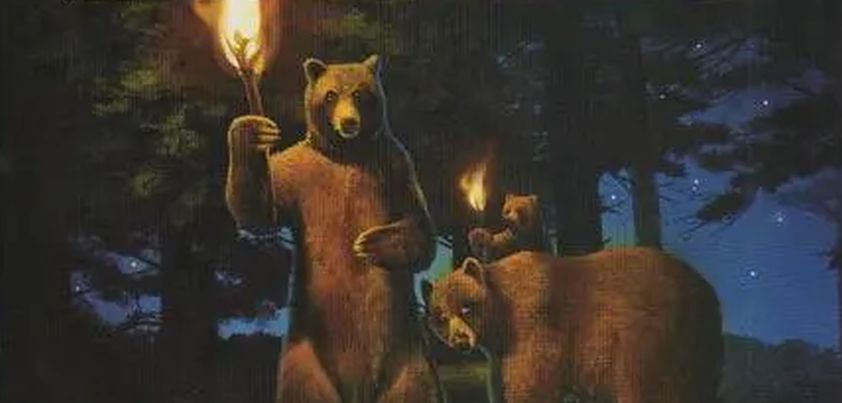 This story from Terry Bisson includes several important themes. Although bears may be thousands of years behind man in discovering fire, they are portrayed as being well ahead of us in terms of consideration, compassion, sharing and inclusiveness. The major theme is the effect of our modern lifestyle on families. Sixty-one-year-old Bobby does his best for his dying mother who, with only the TV for company at her nursing home, has given up on life. His brother is too busy “ministering” and selling real-estate to make time for her, or even pay attention to the needs of his growing son. More…
This story from Terry Bisson includes several important themes. Although bears may be thousands of years behind man in discovering fire, they are portrayed as being well ahead of us in terms of consideration, compassion, sharing and inclusiveness. The major theme is the effect of our modern lifestyle on families. Sixty-one-year-old Bobby does his best for his dying mother who, with only the TV for company at her nursing home, has given up on life. His brother is too busy “ministering” and selling real-estate to make time for her, or even pay attention to the needs of his growing son. More…
By the Waters of Babylon
 Although published well before the atomic age, this story from Stephen Benét provides a remarkable description of a post-apocalyptic world devastated by weapons of mass destruction. Survivors lead a primitive existence. Modern religious beliefs have been replaced by reverence for the “gods” who built (and whose spirits still live in) destroyed buildings. Pointedly, elitism, prejudice and warfare still exist. Priests maintain their status by keeping healing and other knowledge to themselves, and there is constant fighting between the protagonist’s Hill People and the supposedly “ignorant” Forest People. Themes: superstition, destiny, search for knowledge, class, prejudice, warfare, danger of modern weaponry. More…
Although published well before the atomic age, this story from Stephen Benét provides a remarkable description of a post-apocalyptic world devastated by weapons of mass destruction. Survivors lead a primitive existence. Modern religious beliefs have been replaced by reverence for the “gods” who built (and whose spirits still live in) destroyed buildings. Pointedly, elitism, prejudice and warfare still exist. Priests maintain their status by keeping healing and other knowledge to themselves, and there is constant fighting between the protagonist’s Hill People and the supposedly “ignorant” Forest People. Themes: superstition, destiny, search for knowledge, class, prejudice, warfare, danger of modern weaponry. More…
The Man with the Light
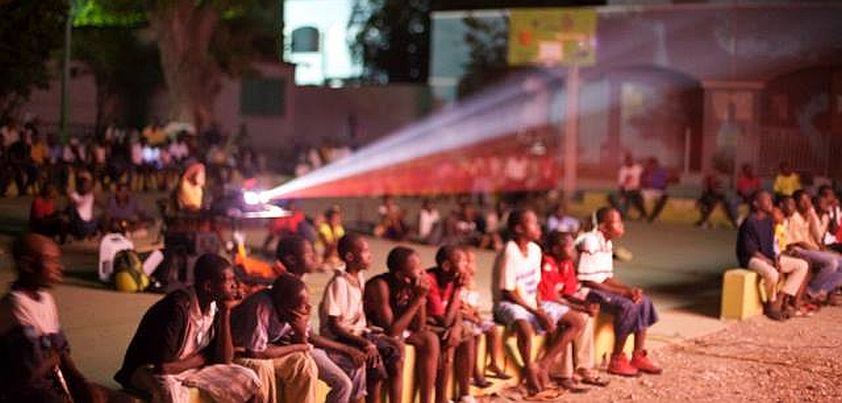 In this story by José Eduardo Agualusa, an itinerant Russian has been traveling remote areas of Angola for over forty years, entertaining villagers with a pedal-powered projector and old films. During one of the country’s many civil wars, his Russian heritage brings him to the attention of authorities. From a hiding place, he watches in horror as the soldiers sent to find him savagely beat and rape innocent bystanders. He talks his way out of arrest, but loses his treasured projector. In desperation, he turns to “James Dean” for help. Themes include aging, brutality, fear, abuse of power, despair. More…
In this story by José Eduardo Agualusa, an itinerant Russian has been traveling remote areas of Angola for over forty years, entertaining villagers with a pedal-powered projector and old films. During one of the country’s many civil wars, his Russian heritage brings him to the attention of authorities. From a hiding place, he watches in horror as the soldiers sent to find him savagely beat and rape innocent bystanders. He talks his way out of arrest, but loses his treasured projector. In desperation, he turns to “James Dean” for help. Themes include aging, brutality, fear, abuse of power, despair. More…
The Star
 In Arthur C. Clarke’s The Star, a manned spaceship travels to the edge of the galaxy to explore a nebula (cloud of interstellar gas) surrounding a collapsed star. Within the nebula is a burnt out planet that miraculously survived the explosion. On the planet is a huge stone marker left by a highly advanced civilization that did not survive. Under the marker, buried deep inside the planet, is a vault containing the civilization’s secrets. Among these is a disturbing discovery that challenges our traditional concepts of God. Themes: religious faith, science vs. religion, humankind as the center of the universe. More…
In Arthur C. Clarke’s The Star, a manned spaceship travels to the edge of the galaxy to explore a nebula (cloud of interstellar gas) surrounding a collapsed star. Within the nebula is a burnt out planet that miraculously survived the explosion. On the planet is a huge stone marker left by a highly advanced civilization that did not survive. Under the marker, buried deep inside the planet, is a vault containing the civilization’s secrets. Among these is a disturbing discovery that challenges our traditional concepts of God. Themes: religious faith, science vs. religion, humankind as the center of the universe. More…
The Gift of the Magi
 Have you ever thought long and hard about what would be the prefect Christmas gift for someone you love? This story by O. Henry is one of the most famous Christmas stories of all time. It tells how a poor couple each sell their most valuable possession in order to buy a Christmas present that they feel is good enough for the one they love. The irony is that neither can use the precious gift the other has bought them. Themes (see analysis) include love, sacrifice, wisdom, beauty, generosity, and value. More…
Have you ever thought long and hard about what would be the prefect Christmas gift for someone you love? This story by O. Henry is one of the most famous Christmas stories of all time. It tells how a poor couple each sell their most valuable possession in order to buy a Christmas present that they feel is good enough for the one they love. The irony is that neither can use the precious gift the other has bought them. Themes (see analysis) include love, sacrifice, wisdom, beauty, generosity, and value. More…
The Interlopers
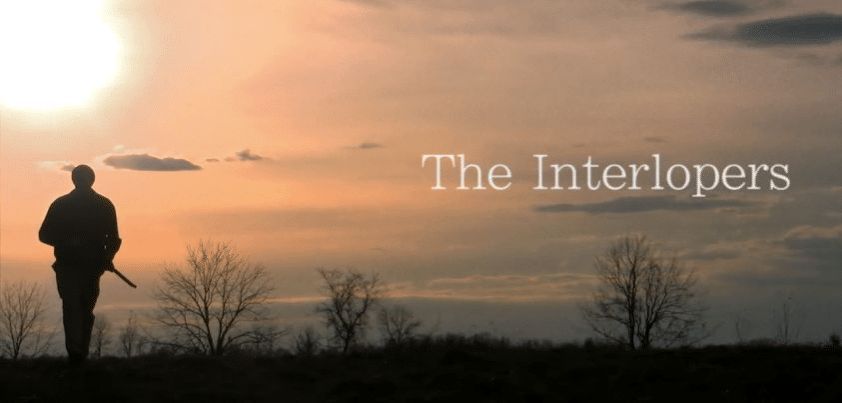 This story by Saki has perhaps the shortest surprise ending of all: a single word that comprises the last line of the story. Two families have been feuding for years over the use of a poor piece of forest land. When the heads of the families find themselves trapped under a fallen tree, they realize how silly they have been and promise to be friends for life. Sadly, just as they are looking forward to a more peaceful future, some unexpected visitors spoil it all. Themes: greed, pride, inherited hatred, man vs. nature, social class. More…
This story by Saki has perhaps the shortest surprise ending of all: a single word that comprises the last line of the story. Two families have been feuding for years over the use of a poor piece of forest land. When the heads of the families find themselves trapped under a fallen tree, they realize how silly they have been and promise to be friends for life. Sadly, just as they are looking forward to a more peaceful future, some unexpected visitors spoil it all. Themes: greed, pride, inherited hatred, man vs. nature, social class. More…
The Outcasts of Poker Flat
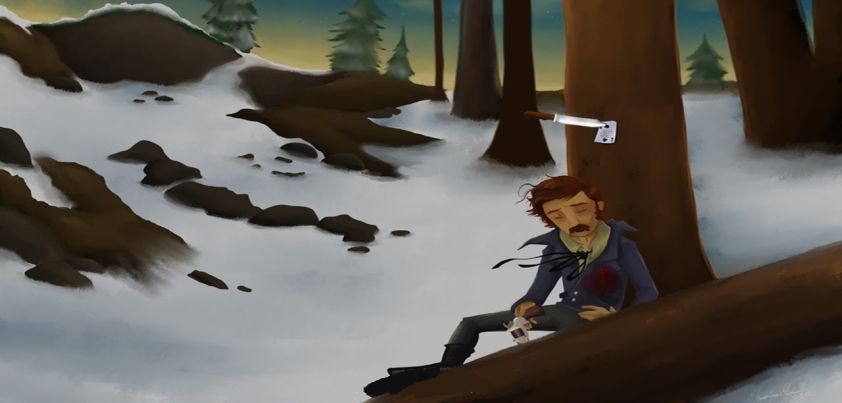 Bret Harte’s “outcasts” are four “improper persons” (a gambler, a prostitute, a brothel madam, and a drunkard and suspected thief) banished by a vigilante group from a Californian Gold Rush town. When they camp for the night on the way to the next settlement, the drunkard steals their horses. The other three and a young couple journeying the other way find themselves “snowed in” in a secluded mountain cabin. With food and firewood running low, we see another side of the remaining outcasts. Themes: appearances; immorality vs. innocence; goodness; sacrifice; the power of nature; luck, fate and human agency. More…
Bret Harte’s “outcasts” are four “improper persons” (a gambler, a prostitute, a brothel madam, and a drunkard and suspected thief) banished by a vigilante group from a Californian Gold Rush town. When they camp for the night on the way to the next settlement, the drunkard steals their horses. The other three and a young couple journeying the other way find themselves “snowed in” in a secluded mountain cabin. With food and firewood running low, we see another side of the remaining outcasts. Themes: appearances; immorality vs. innocence; goodness; sacrifice; the power of nature; luck, fate and human agency. More…
The Bound Man
 This Kafkaesque story by Ilse Aichinger opens with a man waking up to find himself bleeding and bound from head to toe. The ropes are loose enough to allow some movement, but cannot be untied. With difficulty, he manages to stand and “walk” to a nearby village where a circus owner hires him as a performer. He not only becomes famous, but insists on wearing the same bonds night and day for the whole season. In an ambiguous conclusion, an act of compassion ends his career. Themes include insecurity, turning adversity into opportunity, freedom vs. restriction, loneliness, self-discovery, compassion. More…
This Kafkaesque story by Ilse Aichinger opens with a man waking up to find himself bleeding and bound from head to toe. The ropes are loose enough to allow some movement, but cannot be untied. With difficulty, he manages to stand and “walk” to a nearby village where a circus owner hires him as a performer. He not only becomes famous, but insists on wearing the same bonds night and day for the whole season. In an ambiguous conclusion, an act of compassion ends his career. Themes include insecurity, turning adversity into opportunity, freedom vs. restriction, loneliness, self-discovery, compassion. More…
The Centipede
 The major theme of this story by Rony V. Diaz is revenge. A boy who has suffered years of torment from his older sister snaps when she severely beats and injures the eye of his beloved dog. Forgetting she has a weak heart, he plays a cruel, potentially fatal trick on her. The girl’s hatred and victimization of her brother raises the question of whether she, too, is taking revenge (albeit unconsciously) for the death of her mother when giving birth to him. Other themes include dealing with injustice and the need to stop and think before acting in anger. More…
The major theme of this story by Rony V. Diaz is revenge. A boy who has suffered years of torment from his older sister snaps when she severely beats and injures the eye of his beloved dog. Forgetting she has a weak heart, he plays a cruel, potentially fatal trick on her. The girl’s hatred and victimization of her brother raises the question of whether she, too, is taking revenge (albeit unconsciously) for the death of her mother when giving birth to him. Other themes include dealing with injustice and the need to stop and think before acting in anger. More…
The Tell-Tale Heart
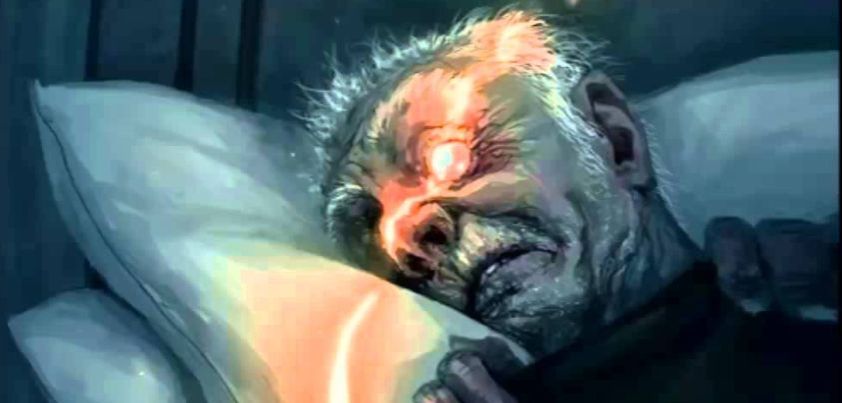 In this Gothic horror story by Edgar Allan Poe, the narrator describes how cleverly he or she has planned and carried out the murder of an old man. The only reason given is fear of what is described as the old man’s ‘vulture eye’. The narrator’s purpose in telling the story is to convince the audience that he or she is not mad. There are a number of ironic aspects to the story, perhaps the greatest being that in trying to prove his or her sanity, the narrator clearly demonstrates the opposite. Themes: mental illness, fear, time, guilt vs. innocence. More…
In this Gothic horror story by Edgar Allan Poe, the narrator describes how cleverly he or she has planned and carried out the murder of an old man. The only reason given is fear of what is described as the old man’s ‘vulture eye’. The narrator’s purpose in telling the story is to convince the audience that he or she is not mad. There are a number of ironic aspects to the story, perhaps the greatest being that in trying to prove his or her sanity, the narrator clearly demonstrates the opposite. Themes: mental illness, fear, time, guilt vs. innocence. More…
The Goophered Grapevine
 Set shortly after the American Civil War, this story from Charles W. Chesnutt is about a “Northerner” with an interest in grape cultivation who moves to the South for his wife’s health. While inspecting a derelict vineyard, they meet a “colored man” who tells how the previous owner had a sorceress put a spell (goopher) on the grapes to stop them being stolen. He then describes the sad fate of a newly acquired slave who, unaware of the spell, “sampled” the grapes. Themes: racism and slavery, the supernatural, greed, exploitation, dishonesty, trickery, karma. More…
Set shortly after the American Civil War, this story from Charles W. Chesnutt is about a “Northerner” with an interest in grape cultivation who moves to the South for his wife’s health. While inspecting a derelict vineyard, they meet a “colored man” who tells how the previous owner had a sorceress put a spell (goopher) on the grapes to stop them being stolen. He then describes the sad fate of a newly acquired slave who, unaware of the spell, “sampled” the grapes. Themes: racism and slavery, the supernatural, greed, exploitation, dishonesty, trickery, karma. More…
Long Distance
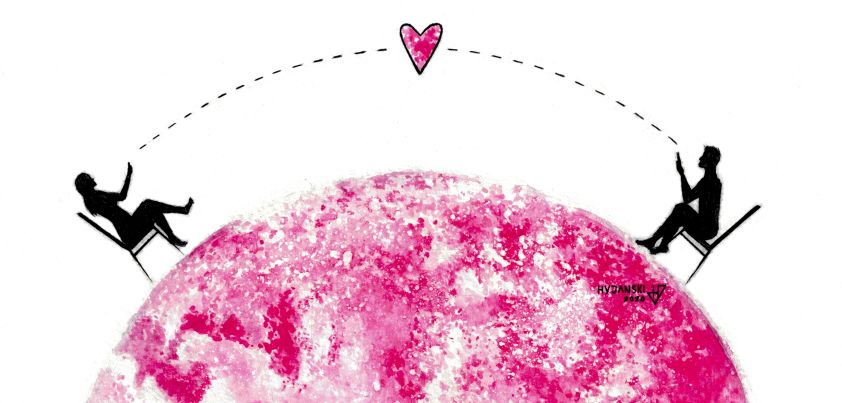 In this story by Jane Smiley, an early middle-aged bachelor learns an important lesson about himself. The story begins with his Japanese girlfriend calling off their long-distance relationship due to the impending death of her father. Although she is distraught, he is relieved because he did not think he could meet her expectations. After drinking too much at a family Christmas gathering, he comes to realize that the self-centered affair has probably ruined the poor woman’s chances of a happy life. Themes include physical and emotional distance, family, marriage, responsibility, identity, loneliness and isolation, selfishness, guilt. More…
In this story by Jane Smiley, an early middle-aged bachelor learns an important lesson about himself. The story begins with his Japanese girlfriend calling off their long-distance relationship due to the impending death of her father. Although she is distraught, he is relieved because he did not think he could meet her expectations. After drinking too much at a family Christmas gathering, he comes to realize that the self-centered affair has probably ruined the poor woman’s chances of a happy life. Themes include physical and emotional distance, family, marriage, responsibility, identity, loneliness and isolation, selfishness, guilt. More…
Repent, Harlequin! Said the Ticktockman
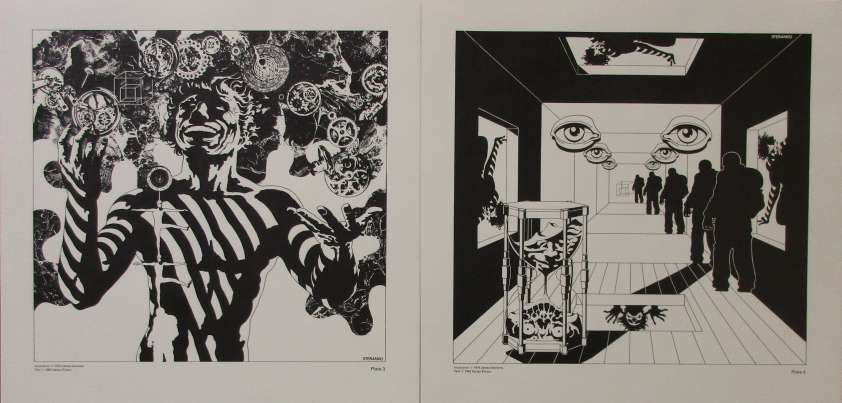 This story by Harlan Ellison takes a satirical look at the way people can become slaves to time. In a future dystopian world, everyone and everything must be on time. The Master Timekeeper (aka the Ticktockman) is responsible for policing this. He has a special power: if someone is late to work or causes something to be delayed, that person has the lost time deducted from their lifespan. Only one man stands against him: a disruptive rebel who calls himself the Harlequin. Themes include totalitarianism, obsession with timeliness and productivity, misused technology, social regimentation, individualism, the futility of individual revolt. More…
This story by Harlan Ellison takes a satirical look at the way people can become slaves to time. In a future dystopian world, everyone and everything must be on time. The Master Timekeeper (aka the Ticktockman) is responsible for policing this. He has a special power: if someone is late to work or causes something to be delayed, that person has the lost time deducted from their lifespan. Only one man stands against him: a disruptive rebel who calls himself the Harlequin. Themes include totalitarianism, obsession with timeliness and productivity, misused technology, social regimentation, individualism, the futility of individual revolt. More…
Champoon
 This tragic story by Dhep Mahapaoraya is set in pre-World War 2 Central Thailand. A mentally disturbed young Thai man relates how, after he and the daughter of a fiercely protective Chinese towkay fell deeply in love, the girl was severely beaten, locked away by day, and chained at night. The determined girl escaped, but met a grisly end in the jaws of a crocodile after finding him taking solace with a young prostitute. He is haunted by the thought that her death may not have been accidental. Themes include love, cruelty, betrayal, corruption, prostitution, excess (alcohol, gambling, women). More…
This tragic story by Dhep Mahapaoraya is set in pre-World War 2 Central Thailand. A mentally disturbed young Thai man relates how, after he and the daughter of a fiercely protective Chinese towkay fell deeply in love, the girl was severely beaten, locked away by day, and chained at night. The determined girl escaped, but met a grisly end in the jaws of a crocodile after finding him taking solace with a young prostitute. He is haunted by the thought that her death may not have been accidental. Themes include love, cruelty, betrayal, corruption, prostitution, excess (alcohol, gambling, women). More…
The Toll-House
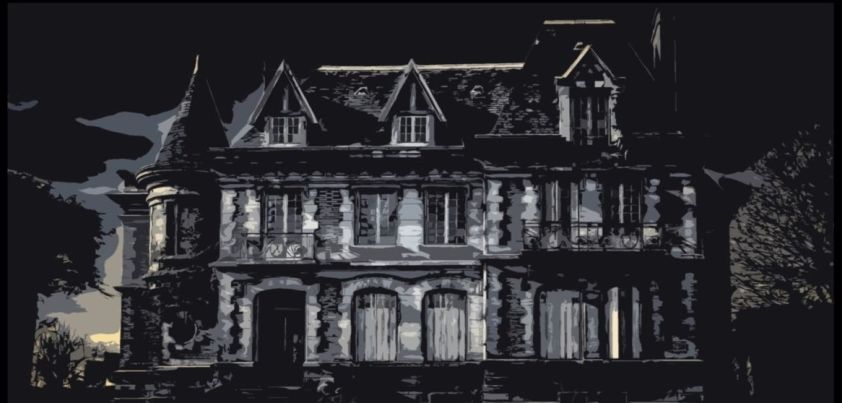 Today we have another classic horror story from W. W. Jacobs. Four young travelers are drinking (tea of all things!) at an Inn. They are discussing the supernatural, and it soon becomes clear that three are believers to varying degrees and one is a total skeptic. One of them tells a story about a nearby haunted house that takes a “toll” of at least one life from every family or group that lives there—however short the time. Foolishly, they decide to put the story to the test. Themes: bravado, fear, the supernatural. More…
Today we have another classic horror story from W. W. Jacobs. Four young travelers are drinking (tea of all things!) at an Inn. They are discussing the supernatural, and it soon becomes clear that three are believers to varying degrees and one is a total skeptic. One of them tells a story about a nearby haunted house that takes a “toll” of at least one life from every family or group that lives there—however short the time. Foolishly, they decide to put the story to the test. Themes: bravado, fear, the supernatural. More…
A Lifestyle
 In this story by Fernando Sorrentino a man relates how being trapped inside his tenth-floor apartment after his key broke off in the lock changed his life. After being refused service and black-listed by the Argentine Locksmiths’ Union, he looks for help elsewhere. He phones the building janitor, his girlfriend and co-workers, and even drops pamphlets to pedestrians on the street below. No one is willing to assist. When his telephone, power and water are cut off, the innovative man develops a thriving farm in his apartment. Themes include resourcefulness, self-sufficiency, isolation, the apathy and redundancy of urban lifestyles. More…
In this story by Fernando Sorrentino a man relates how being trapped inside his tenth-floor apartment after his key broke off in the lock changed his life. After being refused service and black-listed by the Argentine Locksmiths’ Union, he looks for help elsewhere. He phones the building janitor, his girlfriend and co-workers, and even drops pamphlets to pedestrians on the street below. No one is willing to assist. When his telephone, power and water are cut off, the innovative man develops a thriving farm in his apartment. Themes include resourcefulness, self-sufficiency, isolation, the apathy and redundancy of urban lifestyles. More…
Dusk
 James Salter’s Dusk is about the loneliness of reaching middle age and finding yourself alone in the world. Mrs Chandler is a cultured woman who once led an active social life. The narrator describes her as a fine woman whom no one now wanted. Her only son is dead, her other children have moved on, her husband has left her, and her lover is reuniting with his wife. It is hunting season, and she identifies with the wild geese being shot for sport: The rain was coming down, the sea was crashing, a comrade lay dead in the whirling darkness. More…
James Salter’s Dusk is about the loneliness of reaching middle age and finding yourself alone in the world. Mrs Chandler is a cultured woman who once led an active social life. The narrator describes her as a fine woman whom no one now wanted. Her only son is dead, her other children have moved on, her husband has left her, and her lover is reuniting with his wife. It is hunting season, and she identifies with the wild geese being shot for sport: The rain was coming down, the sea was crashing, a comrade lay dead in the whirling darkness. More…
Women in Their Beds
 Gina Berriault’s protagonist is a struggling young actress who has just begun a day job as a social worker in the women’s ward of a city hospital. With no qualifications or experience, she finds it hard to maintain clinical detachment and begins to identify with the suffering, often troubled women in the ward. She reflects on turning points in her own life, and concludes that women are shaped by the beds (a metaphor for common life experiences) they have chosen, or someone else has chosen for them, to lie in. Themes: empathy, choice vs. superstition/destiny, identity, aloneness, connection. More…
Gina Berriault’s protagonist is a struggling young actress who has just begun a day job as a social worker in the women’s ward of a city hospital. With no qualifications or experience, she finds it hard to maintain clinical detachment and begins to identify with the suffering, often troubled women in the ward. She reflects on turning points in her own life, and concludes that women are shaped by the beds (a metaphor for common life experiences) they have chosen, or someone else has chosen for them, to lie in. Themes: empathy, choice vs. superstition/destiny, identity, aloneness, connection. More…
The Elephant Vanishes
 The major theme of this surreal mystery by Haruki Murakami is how commercialism and modernization have upset Japan’s traditional social order. Other themes include unity, perception, disillusionment, alienation, paralysis, isolation and connection. An aging elephant and keeper symbolize the old ways, destined to vanish when displaced by urban development. The city’s absurd responses to the disappearance signify the uneasiness and confusion brought about by the changes. The narrator, a loner used to unity and balance in his life, becomes so disoriented by what he saw on the night of the disappearance that he is unable to make important decisions. More…
The major theme of this surreal mystery by Haruki Murakami is how commercialism and modernization have upset Japan’s traditional social order. Other themes include unity, perception, disillusionment, alienation, paralysis, isolation and connection. An aging elephant and keeper symbolize the old ways, destined to vanish when displaced by urban development. The city’s absurd responses to the disappearance signify the uneasiness and confusion brought about by the changes. The narrator, a loner used to unity and balance in his life, becomes so disoriented by what he saw on the night of the disappearance that he is unable to make important decisions. More…
The Skater
 In this story by Joy Williams, parents (Tom and Annie) take their teenage daughter Molly on an awkward trip from California to New England to look at boarding schools. Sending Molly to school across the country is ostensibly so that the distance will help her deal with the recent death of her older sister Martha. Molly thinks her parents have an ulterior motive… to help them cope more easily with their own grief. Although Molly rejects all the schools, the trip helps all three on their road to recovery. Themes include family, death, grief, acceptance. More…
In this story by Joy Williams, parents (Tom and Annie) take their teenage daughter Molly on an awkward trip from California to New England to look at boarding schools. Sending Molly to school across the country is ostensibly so that the distance will help her deal with the recent death of her older sister Martha. Molly thinks her parents have an ulterior motive… to help them cope more easily with their own grief. Although Molly rejects all the schools, the trip helps all three on their road to recovery. Themes include family, death, grief, acceptance. More…
The Red Convertible
 The titular car in this confronting coming of age story by Louise Erdrich symbolizes freedom and the youthful bonding of Native-American half-brothers Lyman and Henry. Lyman is good with money and responsible. Henry is older, stronger, and more impulsive. On buying the car, they take a summer road-trip through the wilds of Montana before picking up a hitchhiker and driving her all the way home to Alaska. Upon their return, Henry is drafted and sent to Vietnam. He comes back a changed man, suffering a downward spiral of depression and despair. Themes: brotherhood, youth, freedom, PTSD, alienation, suicide, loss. More…
The titular car in this confronting coming of age story by Louise Erdrich symbolizes freedom and the youthful bonding of Native-American half-brothers Lyman and Henry. Lyman is good with money and responsible. Henry is older, stronger, and more impulsive. On buying the car, they take a summer road-trip through the wilds of Montana before picking up a hitchhiker and driving her all the way home to Alaska. Upon their return, Henry is drafted and sent to Vietnam. He comes back a changed man, suffering a downward spiral of depression and despair. Themes: brotherhood, youth, freedom, PTSD, alienation, suicide, loss. More…
The Balek Scales
 This story from Heinrich Böll is a social commentary about a rich family’s exploitation of farm workers. This occurs on three levels, characterized by different forms of “scales”: 1) systematic cheating, involving an incorrectly balanced set of weighing scales; 2) legal injustice, where the scales of justice are weighted firmly in favor of the landowners; and 3) social injustice, where the imbalance of power results in poor pay, long hours, and dangerous working conditions. The workers are incensed by the cheating, but accept the other injustices. Other themes: the whistle-blowing family’s courage and pride, church and wider community apathy. More…
This story from Heinrich Böll is a social commentary about a rich family’s exploitation of farm workers. This occurs on three levels, characterized by different forms of “scales”: 1) systematic cheating, involving an incorrectly balanced set of weighing scales; 2) legal injustice, where the scales of justice are weighted firmly in favor of the landowners; and 3) social injustice, where the imbalance of power results in poor pay, long hours, and dangerous working conditions. The workers are incensed by the cheating, but accept the other injustices. Other themes: the whistle-blowing family’s courage and pride, church and wider community apathy. More…
Squeaker’s Mate
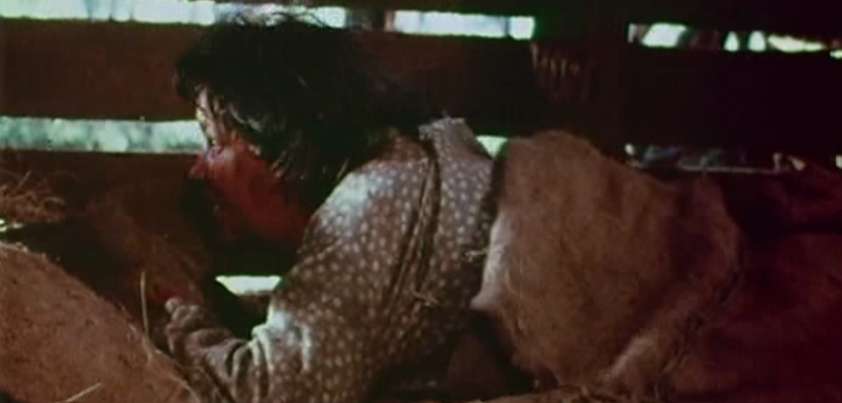 Barbara Baynton’s Squeaker’s Mate is an Australian bush story in which gender stereotypes are reversed and the man is found wanting when disaster strikes. The story raises some interesting issues. Why would a strong, capable woman like Mary choose and put up with a lazy, simple-minded weakling like Squeaker for a “mate”. Could it be that he was her only option? Is Baynton suggesting that other men were intimidated by Mary’s independence and masculinity, or possibly even hinting at sexuality issues that were taboo at the time? Squeaker may not be solely to blame for the outcome. More…
Barbara Baynton’s Squeaker’s Mate is an Australian bush story in which gender stereotypes are reversed and the man is found wanting when disaster strikes. The story raises some interesting issues. Why would a strong, capable woman like Mary choose and put up with a lazy, simple-minded weakling like Squeaker for a “mate”. Could it be that he was her only option? Is Baynton suggesting that other men were intimidated by Mary’s independence and masculinity, or possibly even hinting at sexuality issues that were taboo at the time? Squeaker may not be solely to blame for the outcome. More…
The Sun, the Moon, the Stars
 This story by Junot Díaz examines transnational relationships between young Hispanic Americans. It focuses on the doomed love affair between a Dominican-American man and his long-suffering Cuban girlfriend and, in doing so, the pressures they face from family and friends. It contrasts the woman’s desire for true love and commitment with the man’s unsuccessful attempts to shake off the stereotype of Latino machismo. The man maintains he is not a bad guy, but doesn’t seem to understand how to treat a woman with consideration and respect. Themes include responsibility in relationships, infidelity, self-deception, national pride, socioeconomic differences. More…
This story by Junot Díaz examines transnational relationships between young Hispanic Americans. It focuses on the doomed love affair between a Dominican-American man and his long-suffering Cuban girlfriend and, in doing so, the pressures they face from family and friends. It contrasts the woman’s desire for true love and commitment with the man’s unsuccessful attempts to shake off the stereotype of Latino machismo. The man maintains he is not a bad guy, but doesn’t seem to understand how to treat a woman with consideration and respect. Themes include responsibility in relationships, infidelity, self-deception, national pride, socioeconomic differences. More…
Ahoy, Sailor Boy!
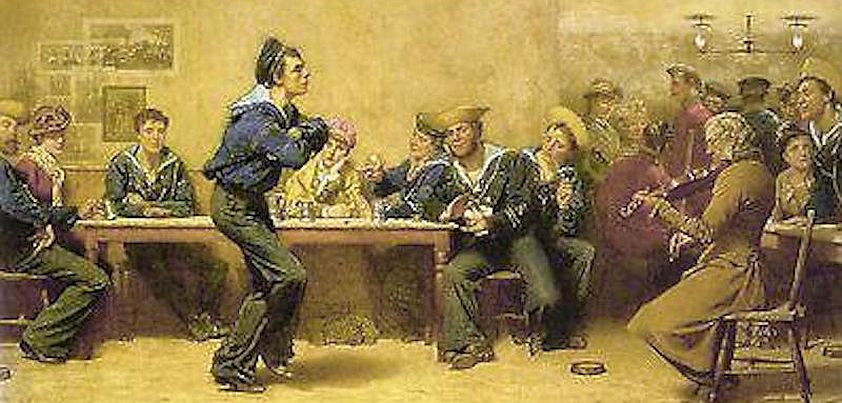 This story by A. E. Coppard takes a light-hearted look at death and what comes after. Following a discussion in an English pub about death and divine retribution, an off-duty sailor unsuccessfully tries to solicit an attractive ghost in a park. The woman’s sin was vanity, as represented by a huge collection of expensive clothing. In order to obtain redemption, she must re-wear and discard every item in the collection. She is wearing the last outfit, and the sailor eagerly watches as she undresses for the last time. Themes include death and the afterlife, vanity, sexuality, kindness, redemption, the supernatural. More…
This story by A. E. Coppard takes a light-hearted look at death and what comes after. Following a discussion in an English pub about death and divine retribution, an off-duty sailor unsuccessfully tries to solicit an attractive ghost in a park. The woman’s sin was vanity, as represented by a huge collection of expensive clothing. In order to obtain redemption, she must re-wear and discard every item in the collection. She is wearing the last outfit, and the sailor eagerly watches as she undresses for the last time. Themes include death and the afterlife, vanity, sexuality, kindness, redemption, the supernatural. More…
The Refugee
 This story by K. A. Abbas deals with the social upheaval caused by the 1947 Partition of India. Told from the perspective of an elderly Sikh woman, it compares the community spirit and religious tolerance that existed before Partition with the hatred, bloodshed and displacement of Sikh and Hindu families that occurred afterwards. The compassionate, once wealthy protagonist, who lost everything when forced to flee Rawalpindi, demonstrates neither bitterness nor self-pity. However, she still sheds a tear for the “soft” memories like ripe apricots and fragrant baggoogoshas… Themes include brotherhood and inclusiveness vs. religious hostility, alienation, suffering, identity, resilience. More…
This story by K. A. Abbas deals with the social upheaval caused by the 1947 Partition of India. Told from the perspective of an elderly Sikh woman, it compares the community spirit and religious tolerance that existed before Partition with the hatred, bloodshed and displacement of Sikh and Hindu families that occurred afterwards. The compassionate, once wealthy protagonist, who lost everything when forced to flee Rawalpindi, demonstrates neither bitterness nor self-pity. However, she still sheds a tear for the “soft” memories like ripe apricots and fragrant baggoogoshas… Themes include brotherhood and inclusiveness vs. religious hostility, alienation, suffering, identity, resilience. More…
Miss Brill
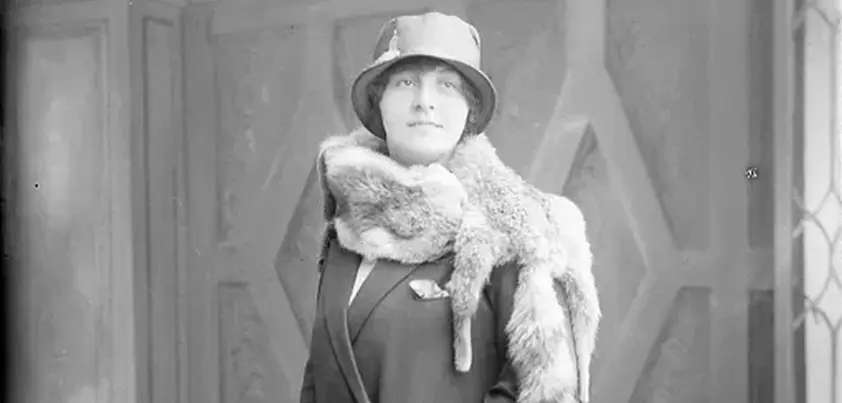 Katherine Mansfield’s Miss Brill is a lonely middle-aged woman for whom the highlight of the week is a Sunday visit to a city park. She occupies herself by eavesdropping on strangers who share her “special” bench, listening to the brass band, and people watching. On this day, she is wearing a favorite fur stole (scarf) and imagines that the park is a huge theatre performance in which she is a central character. The dream is shattered and her day ruined when she overhears some unkind words from her imaginary heroes. Themes: reclusiveness, loneliness, habit, aging, fantasy vs. reality, disillusionment, retreat. More…
Katherine Mansfield’s Miss Brill is a lonely middle-aged woman for whom the highlight of the week is a Sunday visit to a city park. She occupies herself by eavesdropping on strangers who share her “special” bench, listening to the brass band, and people watching. On this day, she is wearing a favorite fur stole (scarf) and imagines that the park is a huge theatre performance in which she is a central character. The dream is shattered and her day ruined when she overhears some unkind words from her imaginary heroes. Themes: reclusiveness, loneliness, habit, aging, fantasy vs. reality, disillusionment, retreat. More…
The Daring Young Man on the Flying Trapeze
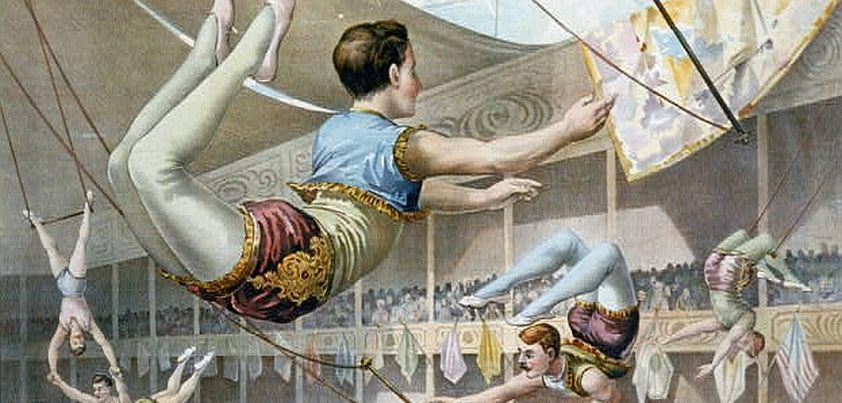 Set in San Francisco during the Great Depression, this story by William Saroyan describes the final day of a young aspiring writer dying of starvation. His creative inspiration comes from dreams, and the story begins with a stream-of-consciousness list of places, people and scenes he has dreamed about but never encountered. Weak with hunger, he spends the day desperately looking for work. Unsuccessful, he tries to write An Application for Permission to Live. Too weak to complete it, he returns home and surrenders himself to a final dream. Themes include poverty, artistic struggle, pride, alienation, despair, existentialism, sleep and dreams. More…
Set in San Francisco during the Great Depression, this story by William Saroyan describes the final day of a young aspiring writer dying of starvation. His creative inspiration comes from dreams, and the story begins with a stream-of-consciousness list of places, people and scenes he has dreamed about but never encountered. Weak with hunger, he spends the day desperately looking for work. Unsuccessful, he tries to write An Application for Permission to Live. Too weak to complete it, he returns home and surrenders himself to a final dream. Themes include poverty, artistic struggle, pride, alienation, despair, existentialism, sleep and dreams. More…
A Good Scent from a Strange Mountain
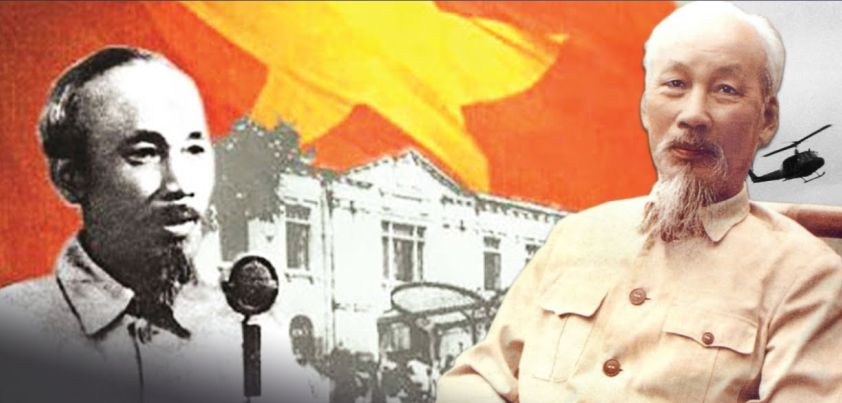 In this story by Robert Olen Butler, an aging Vietnamese-American immigrant prepares for death. As he bids farewell to his family, the restless ghost of his once good friend, Ho Chi Minh, visits him over several nights, triggering memories of the past. He is proud of his daughter, who maintains Vietnamese traditions, but not so his son-in-law and grandson, who have been involved in a political murder. All he wants now is to be reunited with his wife and other dead loved-ones in the “village square”. Themes include aging and death, memories, family, friendship, tradition, politics and war. More…
In this story by Robert Olen Butler, an aging Vietnamese-American immigrant prepares for death. As he bids farewell to his family, the restless ghost of his once good friend, Ho Chi Minh, visits him over several nights, triggering memories of the past. He is proud of his daughter, who maintains Vietnamese traditions, but not so his son-in-law and grandson, who have been involved in a political murder. All he wants now is to be reunited with his wife and other dead loved-ones in the “village square”. Themes include aging and death, memories, family, friendship, tradition, politics and war. More…
A Painful Case
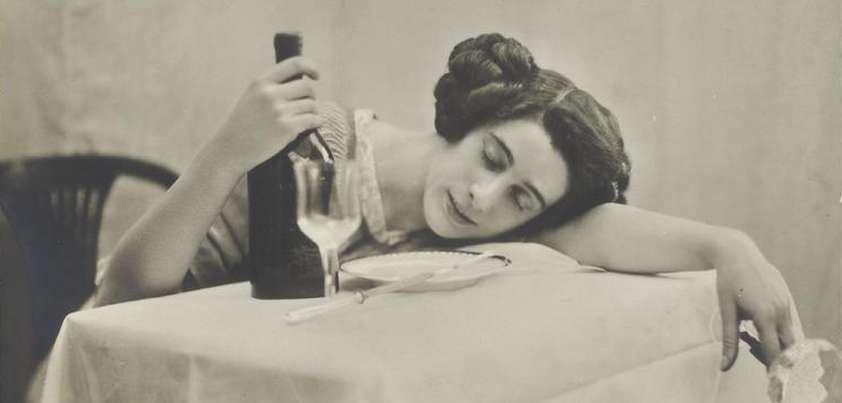 The title of this James Joyce story could refer to both the protagonist and the poor woman he drove to alcoholism and possible suicide. James Duffy is a loner who lives an orderly, spartan life. He meets and becomes close friends with the neglected wife of a sea captain. When she hints at feelings stronger than friendship, he immediately terminates the relationship. This and the cryptic sentence he wrote afterwards about such a friendship being impossible because there must be sexual intercourse highlight the major theme (repressed sexuality). Other themes include loneliness, isolation, order, morality, emotional paralysis, guilt. More…
The title of this James Joyce story could refer to both the protagonist and the poor woman he drove to alcoholism and possible suicide. James Duffy is a loner who lives an orderly, spartan life. He meets and becomes close friends with the neglected wife of a sea captain. When she hints at feelings stronger than friendship, he immediately terminates the relationship. This and the cryptic sentence he wrote afterwards about such a friendship being impossible because there must be sexual intercourse highlight the major theme (repressed sexuality). Other themes include loneliness, isolation, order, morality, emotional paralysis, guilt. More…
The Daffodil Sky
 In this story by H. E. Bates, a man sent to prison for killing a love rival in a jealous rage returns to the scene of the crime. His intent is to confront the woman they were fighting over, who was once his fiancé. As he knocks on her door he has a premonition that if she opened the door he might not be able to restrain himself but would rush straight at her and kill her. Fortunately for him, the person who opens it is a pleasant surprise. Themes: passion, jealousy and rage, choices and consequences, alienation and loneliness. More…
In this story by H. E. Bates, a man sent to prison for killing a love rival in a jealous rage returns to the scene of the crime. His intent is to confront the woman they were fighting over, who was once his fiancé. As he knocks on her door he has a premonition that if she opened the door he might not be able to restrain himself but would rush straight at her and kill her. Fortunately for him, the person who opens it is a pleasant surprise. Themes: passion, jealousy and rage, choices and consequences, alienation and loneliness. More…